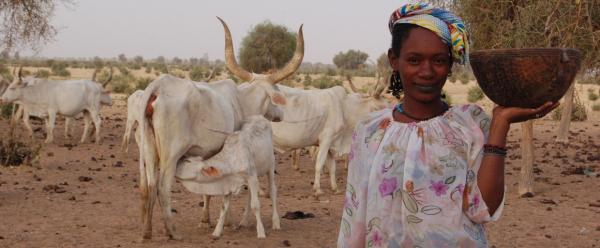Event 9 December 2025
- Home
- CIRAD news
- News
- Nouakchott+10
Nouakchott+10 | CIRAD confirms its commitment to pastoralism

© S. Taugourdeau, Cirad
"In the Sahel, the climate means that we cannot rear livestock unless that livestock is mobile", said Kane Aliou, coordinator of the national network of pastoral associations (GNAP) at the high-level forum on livestock and pastoralism in the Sahel and West Africa, held from 6 to 8 November 2024 in the Mauritanian capital.
Country representatives from West Africa and the Sahel, along with pastoral, agropastoral and agricultural organizations in the region, met in Nouakchott (Mauritania) to assess ten years of investment in favour of pastoral systems since the 2013 declaration on "pastoralism without borders". In particular, the declaration gave rise to the emergence of the Regional Sahel pastoralism support project (PRAPS), coordinated by the Permanent Interstate Committee for Drought Control in the Sahel (CILSS) with the support of the World Bank, in which CIRAD is heavily involved.
"Ten years after the first declaration on pastoralism adopted in Nouakchott in 2013, Nouakchott has again seen a very important step forward for players in rural parts of the Sahel", adds Sandra Rullière, Deputy Head of AFD's Agriculture, Rural Development and Biodiversity Division, who was at the forum.
Taking stock of ten years of action in favour of pastoralism
The event served to take stock of ten years of efforts and action in favour of pastoral and agropastoral communities, and to design future pathways. A new declaration in favour of developing and securing pastoral systems in West Africa and the Sahel was adopted. It calls on States and citizens to pool their efforts to build a peaceful, prosperous future for pastoral and agropastoral rural territories.
CIRAD has been working for pastoralism for 40 years…
For several decades now, CIRAD has been working to generate knowledge to fuel public policy in favour of pastoral and agropastoral population groups in West Africa and the Sahel. That work has covered topics such as agroecology, the One Health approach, territory management and climate change. It has been done in collaboration with numerous partners, notably within the framework of the PRAPS project (phases 1 and 2), and DeSIRA projects such as CaSSECS, ACCEPT, Santés & Territoires or the PREZODE initiative with AfriCam. Lastly, CIRAD has been heavily involved in the Pastoralism and drylands platform in partnership since its founding in 2000.
… and was at the event to defend new topics
"For CIRAD, it was very important to be at the event, because we have embarked on the second phase of PRAPS, which supports the initiative", Jean-Daniel Cesaro, a CIRAD geographer involved in PRAPS, explains. "The declaration will enable us to defend new topics such as cross-border cooperation, the economic and social development of more peaceful territories, and more sustainable integration of livestock value chains."
Mobile livestock production calls for cross-border coordination
Whether for transhumance or sales, livestock mobility is crucial to the sustainability of pastoralism and of animal product value chains in West Africa. For herders to be mobile, countries must cooperate and coordinate. Cross-border cooperation is key to addressing the challenges surrounding insecurity, the pastoral economy and the dynamics of movement between the Sahel countries and others on the coast.
At the forum, CIRAD teams were involved in drafting technical notes, as part of the consortium with the Institut de recherches et d’applications de méthodes de développement (IRAM), and in leading workshops on climate change, the pastoral economy and its value chains, and the changes in pastoral societies as a result of climate change.
CIRAD's mobilization at Nouakchott+10 was proof of its commitment to promote research on pastoral and agropastoral systems in West Africa and the Sahel, including issues relating to environmental sustainability, territorial and cross-border cooperation, security and social cohesion in training and capacity building operations for its partners. "In view of the security, climate and socioeconomic challenges, there is an urgent need for public policy to take greater account of mobile livestock production systems and the pastoral and agropastoral communities that depend on them", says Ibra Touré, CIRAD Regional Director for West Africa - Dry Zone. "The Nouakchott+10 forum was a unique opportunity for States, development partners, the private sector and local players to reaffirm their commitment to this strategic sector."
Pastoralism in figures
- 80 million people make a living from pastoralism and agropastoralism in West Africa
- 70% of herders are young people and women
- The population in West Africa is set to double by 2050, as is demand for animal products.
PRAPS in figures
- 559 water points created
- 362 new livestock markets and 92 slaughter slabs created
- 4200 km of waymarked transhumance corridors
- 55 376 people, 86% of them women, have benefited from support to diversify their income sources
- 600 million animals vaccinated
- 137 veterinarians trained
- 415 new vaccination stations
- 193 additional veterinary stations
- 6.7 million hectares of pastoral zones are managed sustainably.




























